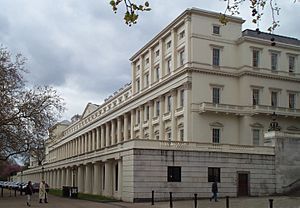Leverhulme Medal (Royal Society) facts for kids
The Leverhulme Medal is a special award given out by the Royal Society in the United Kingdom. It's given every three years to someone who has made a super important discovery or contribution in the world of chemistry or engineering. This includes things like chemical engineering, which mixes chemistry and engineering to solve problems.
Contents
What is the Leverhulme Medal?
The Leverhulme Medal was created in 1960. This was a big year because it marked 300 years since the Royal Society was first started. A group called the Leverhulme Trust gave money to create this medal. Along with the medal, the winner also gets a gift of £2000.
Who Gives the Award?
The Royal Society is a very old and famous group of scientists. It was founded in 1660 and is one of the oldest scientific organizations in the world. They give out many awards, and the Leverhulme Medal is one of their important ones.
What Kind of Work Does it Celebrate?
The medal celebrates amazing work in two main areas:
- Chemistry: This is the study of what things are made of and how they react.
- Engineering: This is about designing and building things, like machines, structures, or processes. Chemical engineering, for example, uses chemistry to design industrial processes.
Who Has Won the Medal?
Since it started, the Leverhulme Medal has been given out 21 times. Unlike some other awards, no one has ever won the Leverhulme Medal more than once. Most of the winners, 19 out of 21, have been from the United Kingdom.
Famous Winners and Firsts
Two people from other countries have won the medal:
- Man Mohan Sharma from India won in 1996. He was recognized for his work on how different chemicals react together in big industrial factories.
- Frank Caruso from Australia won in 2019. He was honored for his work on using tiny engineered particles in biology and medicine.
Some winners of the Leverhulme Medal have also won the famous Nobel Prize in Chemistry:
- Archer John Porter Martin won the Leverhulme Medal in 1963 for his important discoveries in a method called chromatography. He had already won the Nobel Prize in 1952.
- Cyril Norman Hinshelwood won the first Leverhulme Medal in 1960 for his great work in physical chemistry. He won the Nobel Prize in 1956.
In 2016, Anne Neville made history by becoming the first woman to receive the Leverhulme Medal. She was recognized for her research on how different surfaces interact, especially in engineering.
List of Leverhulme Medal Winners
Here is a list of the amazing people who have won the Leverhulme Medal:
| Year | Name | What they won for (simplified) |
|---|---|---|
| 1960 | Cyril Norman Hinshelwood | For his important work in physical chemistry. |
| 1963 | Archer John Porter Martin | For his discoveries in chromatography, a way to separate mixtures. |
| 1966 | Alec Issigonis | For his great designs of cars, especially the Morris Minor and Mini. |
| 1969 | Hans Kronberger | For his leadership and work in nuclear reactor research. |
| 1972 | John Adams | For his work developing particle accelerators. |
| 1975 | Frank Rose | For applying chemical science to industry. |
| 1978 | Frederick Warner | For his engineering work, especially in controlling pollution. |
| 1981 | Stanley Hooker | For his work on jet engines, including those for the Rolls-Royce. |
| 1984 | John Frank Davidson | For his contributions to chemical engineering, especially using fluidized beds. |
| 1987 | George William Gray | For his work on liquid crystals, used in many displays. |
| 1990 | Ray Freeman | For new ways to use nuclear magnetic resonance spectroscopy. |
| 1993 | John Rowlinson | For his work on thermodynamics and how liquids and gases interact. |
| 1996 | Man Mohan Sharma | For his work on chemical reactions in industrial processes. |
| 1999 | Jack Baldwin | For his contributions to organic chemistry, including work on antibiotics. |
| 2002 | Nicholas Handy | For his pioneering work in quantum chemistry, which helps understand molecules. |
| 2005 | John Knott | For understanding how metals and alloys break. |
| 2008 | Anthony Cheetham | For discovering and describing new materials for catalysis and storage. |
| 2010 | Martyn Poliakoff | For his contributions to Green Chemistry and using supercritical fluids. |
| 2013 | Konstantin Novoselov | For his revolutionary work on graphene and other two-dimensional materials. |
| 2016 | Anne Neville | For her research on how surfaces interact, especially in tribology and corrosion. |
| 2019 | Frank Caruso | For applying engineered particles in biology and medicine. |
| 2022 | Charlotte Williams | For her pioneering work on using carbon dioxide in new ways. |
 | Charles R. Drew |
 | Benjamin Banneker |
 | Jane C. Wright |
 | Roger Arliner Young |


